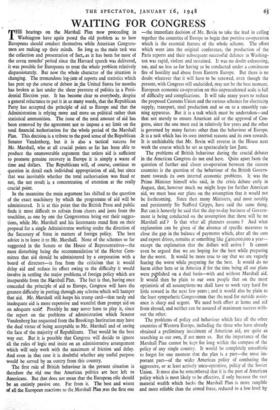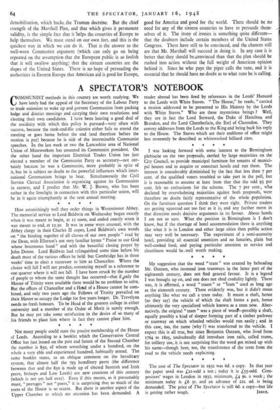WAITING FOR CONGRESS •
THE hearings on the Marshall Plan now proceeding in Washington have again posed the old problem as to how Europeans should conduct themselves while American Congress- men are making up their minds. So long as the main task was the collection and presentation of fact, as it has been for most of the seven months' period since the Harvard speech was delivered, it was possible for Europeans to treat the whole problem relatively dispassionately. But now the whole character of the situation is changing. The tremendous log-jam of reports and statistics which has pent up the course of debate in the United States for months has broken at last under the sheer pressure of politics in a PreSi- dential Election year. It has become clear to everybody, despite a general reluctance to put it in so many words, that the Republican Party has accepted the principle of aid to Europe and that the Administration is relying more and more on political rather than statistical ammunition. The issue of the total amount of aid has been removed by the agreement not to impose a set limit on the total financial -authorisation for the whole period of the Marshall Plan. This decision is a tribute to the good sense of the Republican Senator Vandenberg, but it is also a tactical success for Mr. Marshall, who at all crucial points so far has been able to produce the unanswerable argument that unless aid is sufficient to promote genuine recovery in Europe it is simply a waste of time and dollars. The Republicans will, of course, continue to question in detail each individual appropriation of aid, but since that was inevitable whether the total authorisation was fixed or not, the net result is a concentration of attention at the really crucial point.
In the meantime the main argument has shifted to the question of the exact machinery by which the programme of aid will be administered. It is at this point that the British Press and public finds it most difficult to refrain from cheers and jeers from the touchline, as one by one the Congressmen bring out their sugges- tions, while Mr. Marshall and his lieutenants stand firm on their proposal for a single Administrator working under the direction of the Secretary of State in matters of foreign policy. The best advice is to leave it to Mr. Marshall. None of the schemes so far suggested in the Senate or the House of Representatives—the most disturbing being the recommendation of the Herter Com- mittee that aid should be administered by a corporation with a board of directors—is free from the criticism that it would delay aid and reduce its effect owing to the difficulty it would involve in settling the major problems, of foreign policy which are inseparable from the Marshall Plan. The fact is that, having once conceded the principle of aid to Europe, Congress will have the greatest difficulty in putting through any scheme which will hamper that aid. Mr. Marshall still keeps his trump card—that tardy and inadequate aid is more expensive and wasteful than prompt aid on an adequate scale Possibly he may never have to play it, since the report on the problems of administration which Senator Vandenberg has requested from the Brookings Institution may have the dual virtue of being acceptable to Mr. Marshall and of saving the face of the majority of Republicans. That would be the best way out. But it is possible that Congress will decide to ignore all the rules of logic and insist on an administrative arrangement which will' only work with the maximum of friction and delay. And even in that case it is doubtful whether any useful purpose would be served by an outcry from this country.
The first rule of British behaviour in the present situation is therefore the old one that American politics are best left to Americans.. But that does not mean that the European role should be an entirely passive one. Far from it. The best and wisest of all the European reactions to the Marshall Plan was the first one —the immediate decision of Mr. Bevin to take the lead in calling together the countries of Europe to begin that positive co-operation which is the essential feature of the whole scheme. The effort which went into the original conference, the production of the Paris reports and their subsequent successful defence in Washing- ton was rapid, violent and sustained. It was no doubt exhausting, too, and no less so for having to be conducted under a continuous fire of hostility and abuse from Eastern Europe. But there is no doubt whatever that it will have to be renewed, even though the present, with Congress still undecided, may not be the best moment. European economic co-operation on this unprecedented scale is full of difficulty and complications. It will take many years to reduce the proposed Customs Union and the various schemes for electricity supply, transport, steel production and so on to a smoothly run- ning apparatus. But it is a task which must be undertaken—and that not merely to ensure American aid or the approval of Con- gress, since the one must end in relatively few years and the other is governed by many factors other than the behaviour of Europe. It is a task which has its own internal reasons and its own rewards. It is unthinkable that Mr. Bevin will reverse in the House next week the course which he set so spectacularly last June.
The problems of British behaviour during the crucial debates in the American Congress do not end here. Quite apart from the question of further and closer co-operation between the sixteen countries is the question of the behaviour of the British Govern. ment towards its own internal economic problems. It was the Prime Minister himself who said, in the crisis debate early in August, that, however much we might hope for further American aid, we must base our plans on the assumption that it would not be forthcoming. Since then many Ministers, and most notably and persistently Sir Stafford Cripps, have said the same thing. But can it honestly be said that the day-to-day business of Govern- ment is being conducted on the assumption that there will be no Marshall aid ? Is that what all planners assume ? And what explanation can be given of the absence of specific measures to close the gap in the balance of payments which, after all the cuts and export drives, remains at something like £400,000,000 a year— except the explanation that the dollars will arrive ? It cannot even be argued that we are hoping for the best while preparing for the worst. It would be more true to say that we are vaguely fearing the worst while preparing for the best. It would do no harm either here or in America if for the time being all our plans were published on a dual basis—with and without Marshall aid. It would then be plain to our own people that on the most optimistic of all assumptions we shall have to work very hard for little reward in the next few years ; and it would also be plain to the least sympathetic Congressman that the need for outside assist- ance is sharp and urgent. We need both effort at home and aid from abroad, and neither can be assured of maximum success with- out the other.
The problems of policy and behaviour which face all the other countries of Western Europe, including the three who have already obtained a preliminary instalment of American aid, are quite as searching as our own, if not more so. But the importance of the Marshall Plan cannot be kept for long within the compass of the policy of any single country. It would be completely unrealistic to forget for one moment that the plan is a part—the most im- portant part—of the wider American policy of combating the aggressive, or at least actively unco-operative, policy of the Soviet Union. It must also be remembered that it is the part of American policy which is most likely to be effective, if only because the vast material wealth which backs the Marshall Plan is more tangible and more reliable than the armed force, reduced to a low level by demobilisation, which backs .the Truman doctrine. But the chief strength of the Marshall Plan, and that which gives it permanent validity, is the simple fact that it 'helps the countries of Europe to help themselves. We must stand on our own feet, and this is the quickest way in which we can do it. That is the answer to the well-worn Communist argument (which can only go on being repeated on the assumption that the European public is so foolish that it will swallow anything) that the sixteen countries are the dupes of the United States. There is no hope of persuading the authorities in Eastern Europe that American aid is good for Europe, good for America and good for the world. There should be no need for any of the sixteen countries to have to persuade them- selves of it. The irony of ironies is something quite different— that the doubters include certain members of the United States Congress. These have still to be convinced, and the chances still are that Mr. Marshall will succeed in doing it. In any case it is better that they should beiconvinced than that the plan should be rushed into action without the full weight of American opinion behind it. Since he who pays the piper calls the tune, and it is essential that he should have no doubt as to what tune he is calling.



































 Previous page
Previous page